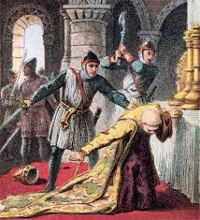Thomas Becket of England
The enmity between the two men became personal. Henry eventually demanded that Becket pay a large sum of money for a collection of what would otherwise have been petty offenses. Matters came to a head finally when Henry wanted to punish Philip de Brois. Becket disavowed Henry's authority to punish members of the clergy. Henry threatened violence, and Becket fled to France. Becket found a willing audience in the French king, Louis VII, who was still chafing at Henry's marriage to his former wife and at the various conflicts in which the two monarchs had engaged in recent years. Pope Alexander III also saw Henry as a threat to Church authority in England. Becket stayed for a while at an abbey in Burgundy, during which time Henry confiscated all of Becket's property and banished his family. In 1166, through the Assize of Clarendon, Henry had stopped the practice of accused people being tried by church courts entirely, replacing it with trial by jury. When Henry and Louis met in January 1169, in an attempt to end the struggle, Becket threw himself on Henry's mercy and begged forgiveness. The one thing that Becket refused to do, however, was recognize Henry's authority as drawn up in the Constitutions of Clarendon. Henry refused to forgive or forget. The following year, however, Henry was in a mood to listen to more entreaties from Becket, and the two had a slight reconciliation. Becket returned to England on Dec. 1, 1170. It wasn't long until the two men were at loggerheads again. One of the primary causes was the excommunication by Becket of the three bishops who had conducted the coronation of Henry's son, also named Henry, as heir and successor; that job was traditionally afforded the Archbishop of Canterbury, but Becket was absent and Henry didn't ask him to return. Instead, officiating at the coronation had been Archbishop of York Roger de Pont L'Eveque, Bishop of London Gilbert Foliot, and Bishop of Salisbury Josceline de Bohon. 
When Henry, still in France, heard of the excommunications, he flew into a rage and wished for some resolution to the conflict. Many historians quote Henry as saying something along the lines of, "Will no one rid me of this turbulent priest?" Four knights loyal to the king sailed for England, and found Becket in his own cathedral on Dec. 29, 1170, during the religious ceremony of Vespers. One of the men asked "Where is the traitor?" Becket responded, "Here I am, no traitor, but archbishop and priest of God." The knights tried to convince him to leave the cathedral, to return with them to Winchester to face the king's wrath, but Becket refused; they slew him on the spot. He was buried there. Henry was devastated by the act and spent three years in mourning, after which he entered the cathedral that was the site of the murder, knelt barefoot before Becket's tomb, and endured a beating from the priests who had gathered there, a year after the pope had declared Becket a saint. First page > Early Years > Page 1 2 |
|




